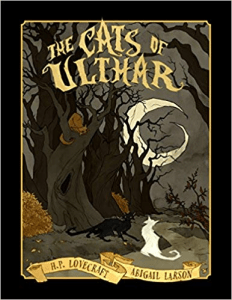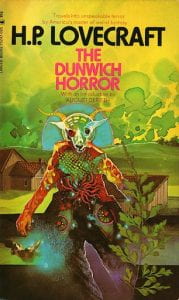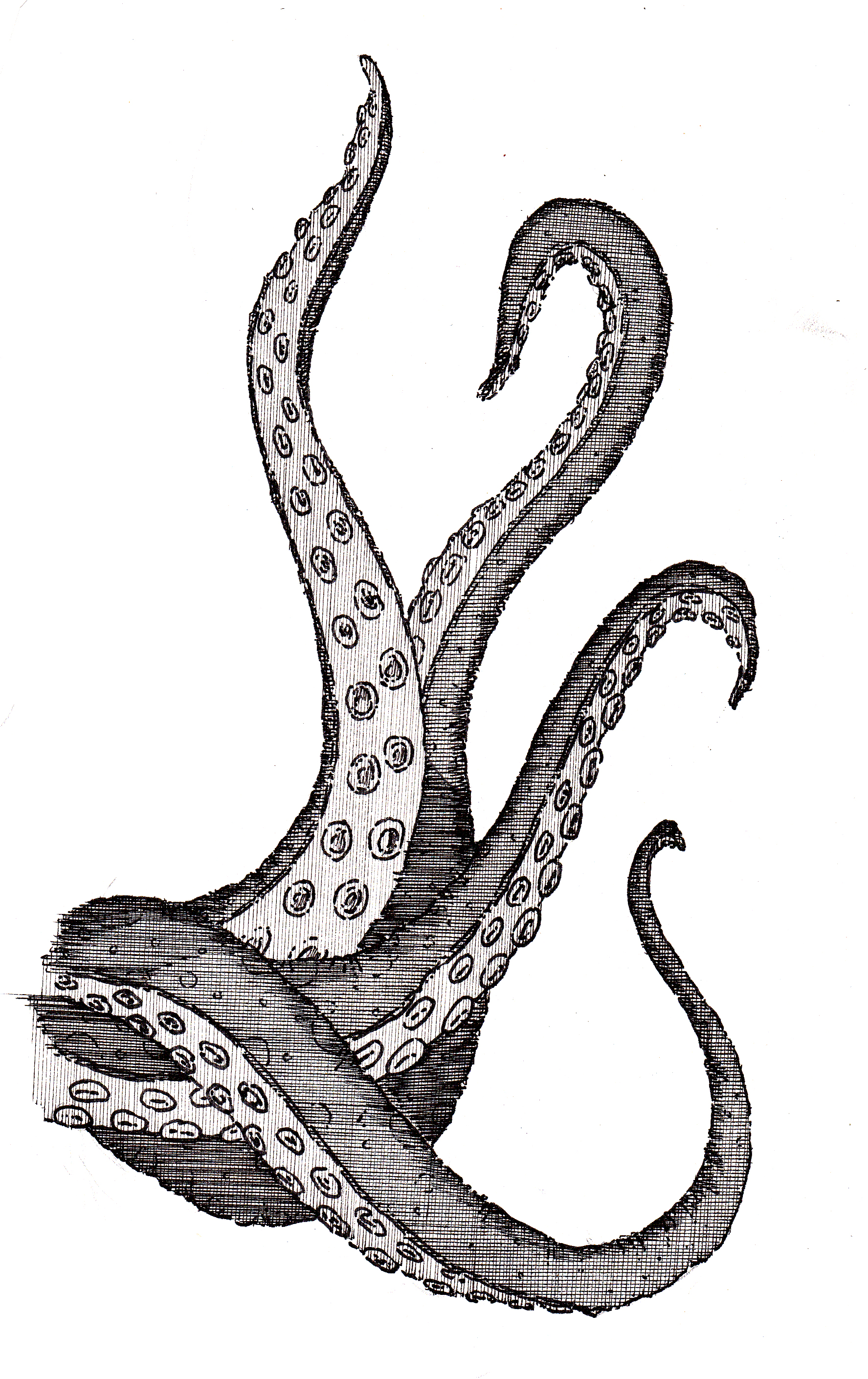Biography:
- Howard Phillip Lovecraft
- Born August 20, 1890 in Providence Rhode Island
- At around the age of 3, his father developed a mental disorder due to untreated syphilis and was admitted to the Butler Hospital in 1893 where he stayed until he died in 1898.
- He had very poor health and spent most of his time at home. He did attend high school, but he had a nervous breakdown before he could get his diploma. This caused him to be unable to pursue his interest in the sciences
- He instead chose to spend most of his time in seclusion, staying up late and studying
- Near the time of his death, Lovecraft was struggling to make ends meet and was working as a ghost writer . He eventually died of cancer on March 15, 1937
- Published in horror magazine Weird Tales in 1923
Inspirations:
Edgar Allen Poe Friedrich Niezche Lord Dunsany
Style/Genre
Style: In the early years of Lovecraft’s writing career, he adapted the formal British style much so in emulation of authors from prior decades. Having admired Lord Dunsany’s writing, there was striking similarities between their writing, particularly with the use of complex, precise sentence structures rather than the more natural speech. Although the echoes of previous writers eventually faded away, Lovecraft continued to draw in inspiration from Great Britain – the country of reputable men, aristocrats and Protestants; thus the formal archaic language was deliberately used to enhance the context of many of his stories.
Much of Lovecraft’s story was crafted on the bases of reasoning and his dislike of religion, formulating ideas driven from science rather than emotion. This can be evident in the narrators of Lovecraft’s pieces in which they describe what they see or perceive but never display the emotions associated with the scenario.
Perhaps what is most differentiable about his writing is the burst of horrific revelations near the end rather than the typical sparks which build up over time.
Genre: the dominating genre of H P Lovecraft’s writing is Cosmic Horror
HP Lovecraft first introduced the idea of Cosmic Horror through his various writings. In definition cosmic horror is the power of making us feel small, insignificant, and totally useless and helpless against something vast and natural. An example of this is the panic you might feel if the electricity has gone out and you encounter a pitch black house. Cosmic horror is when the unknown raises up against the known and the imbalance that is created there. It is a lot about the psychological influences as well, cosmic horror enters into the unknown of the mind and interferes with the concept of what is the reality of that moment.
Lovecraftian horror – Subgenre of horror fiction it puts more emphasis on the cosmic horror of the unknown rather then gore or shock elements in other genres of horror. Refined this type of horror through his years of writing and his style of storytelling that included this in his own myths and world creating in his writing which included supernatural, pre-human, and extraterrestrial elements.
Cosmic horror- “fear and awe we feel when confronted by phenomena beyond our comprehension, whose scope extends beyond the narrow field of human affairs and boasts of cosmic significance”- Racklicas, Vivian
Horror comes from the discovery of an appalling truth.
Themes
Cosmicism– Idea developed by Lovecraft that states that there is no recognizable higher being like God, and that humans are just a small, insignificant part of the much larger scheme of intergalactic existence
Forbidden knowledge – Significantly emphasized in his writing and connects to the presence of cosmicism where a great incomprehensible truth is shared with the reader. Also present in the story of Adam and Eve and other religious stories.
Herbert West, Cthulhu
Fate – often times the characters in Lovecraft’s pieces are not able to control their own actions or find it impossible to advocate and implement change. Many a times, characters can simply flee from threats and danger; however, it seems as if an external force prevents them from escaping danger.
Rats in the walls
Race, ethnicity, class – Lovecraft’s racial attitude was vastly influenced by the New England society he grew up in; however his racism appeared stronger than the general popular viewpoint. Although he praised groups such as the Hispanics and Jews, many of his private writings on Irish Catholics or German immigrants were consistently negative. Lovecraft describes black people not as humans but as “beasts in semi-human figure, filled with vice”
Ex. Rats in the walls
Inherited Guilt – Lovecraft often brings up the subject of ancestral guilt in which he proposes that bloodline can never escape the stain of crimes committed by their forefathers. It may be that descendents are not in account with the past wrongdoings neither are they capable of performing such deeds; nonetheless, they will be haunted by the past.
- Rats in the walls
Religion – Lovecraft’s work manifests many distinct pantheons of deities who have no particular interest or sympathy to mankind. This Philosophy came to be known as “cosmic indifference” which is the idea that human beings are often subject to powerful forces; however since these forces are indifferent toward humanity, they are not malevolent or evil.
All I say is that I think it is damned unlikely that anything like a central cosmic will, a spirit world, or an eternal survival of personality exist. They are the most preposterous and unjustified of all the guesses which can be made about the universe, and I am not enough of a hairsplitter to pretend that I don’t regard them as arrant and negligible moonshine. In theory, I am an agnostic, but pending the appearance of radical evidence I must be classed, practically and provisionally, as an atheist.
Advice to Writers
 No aspiring author should content himself with a mere acquisition of technical rules…All attempts at gaining literary polish must begin with judicious reading, and the learner must never cease to hold this phase uppermost.
No aspiring author should content himself with a mere acquisition of technical rules…All attempts at gaining literary polish must begin with judicious reading, and the learner must never cease to hold this phase uppermost.
It is also important that cheaper types of reading, if hitherto followed, be dropped. Popular magazines inculcate a careless and deplorable style which is hard to unlearn, and which impedes the acquisition of a purer style. If such things must be read, let them be skimmed over as lightly as possible.
The average student is gravely impeded by the narrow range of words from which he must choose, and he soon discovers that in long compositions he cannot avoid monotony. In reading, the novice should note the varied mode of expression practiced by good authors, and should keep in his mind for future use the many appropriate synonymes he encounters. But in enlarging the vocabulary, we must beware lest we misuse our new possessions.
https://www.brainpickings.org/2013/01/11/h-p-lovecraft-advice-on-writing
Famous Works

The Shadow Over Innsmouth
The narrator is a student who is travelling across New England. He come to a nearby seaport where he interacts with strange people and witnesses disturbing events that lead him to horrifying revelations about himself.

The Cats Of Ulthar
The narrator tells the story of why the killing of cats is forbidden in the town of Ulthar.

The Dunwhich Horror
Wilbur Whately is an unusual child born from unnatural parentage. His birth is only the beginning of the true horrors of Dunwich.

The Call of Cthulhu
While organizing the affairs of his late Uncle, a man accidentally stumbles across a series of clues towards an ancient horror lurking beneath the sea, waiting for the time when the “Stars are Right” and it shall be free to wreak havoc upon mankind.

Herbert West: Reanimator
The narrator tells the haunting story of his friend Herbert West, who went mad after obsessing over finding a way to make the dead come back to life.

The Rats in the Wall
A man returns home only to be greeted by the sounds of scurrying rats in his walls. The sound drives him crazy, so he begins to investigate the source which leads him to discover a horrifying secret about his ancestors.
Quote Analysis
“My searchlight expired, but I still ran. I heard voices, and yowls, and echoes, but above all there gently rose that impious, insidious scurrying, gently rising, rising as a stiff bloated corpse gently rises above an oily river that flows under endless onyx bridges to a black putrid sea. Something bumped into me – something soft and plump. It must have been the rats; the viscous, gelatinous, ravenous army that feast on the dead and the living…” – The Rats in the Wall, H.P Lovecraft
“Gradually I came to find Herbert West himself more horrible than anything he did—that was when it dawned on me that his once normal scientific zeal for prolonging life had subtly degenerated into a mere morbid and ghoulish curiosity and secret sense of charnel picturesqueness. His interest became a hellish and perverse addiction to the repellently and fiendishly abnormal; he gloated calmly over artificial monstrosities which would make most healthy men drop dead from fright and disgust; he became, behind his pallid intellectuality, a fastidious Baudelaire of physical experiment—a languid Elagabalus of the tombs.” – Herbert West: Reanimator, H.P Lovecraft
Emulation
“ I have looked upon all the universe has to hold of horror, and even the skies of spring and flowers of summer must ever afterward be poison to me.”
― H.P. Lovecraft, The Call of Cthulhu
I have looked upon all the universe has to hold,
l0oked upon the blue spring skies of may
how they flow from day to day
twisting and churning from night to day.
I have seen the free flowing flowers of summer
how they bring life to the world;
blooming into a incandescent flow of colour and light.
I have looked upon all the universe and have seen the hope it holds.





